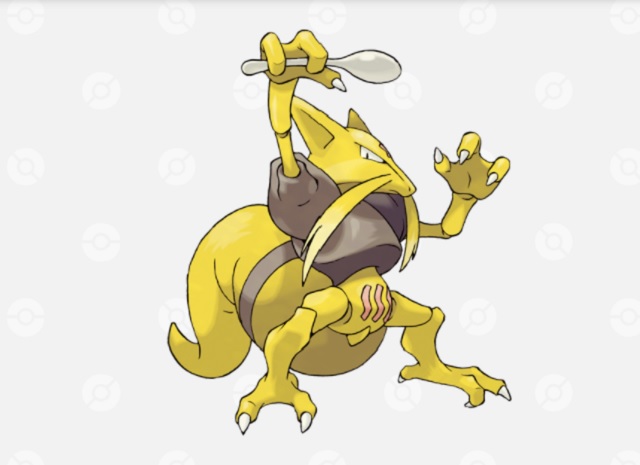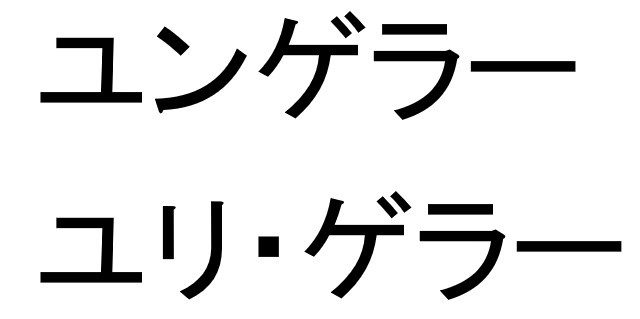
Spoon-bender says it’s now up to Nintendo, but he’s actually talking to the wrong company.
Pokémon started out with 151 different Pocket Monsters, and in the years since the franchise has grown to include nearly 900 species. So even if you’re a pretty big fan, you might not have noticed that one of the first-generation Pokémon has been missing from the card game for a very long time.
That species is Kadabara, who’s been absent from Pokémon cards for close to 20 years due to a complaint from self-proclaimed psychic/proclaimed-by-others charlatan Uri Geller, but it looks like the feud may finally be over, as shown in a Tweet from Geller himself.
I am truly sorry for what I did 20 years ago. Kids and grownups I am releasing the ban. It’s now all up to #Nintendo to bring my #kadabra #pokemon card back.
— Uri Geller (@TheUriGeller) November 28, 2020
It will probably be one of the rarest cards now! Much energy and love to all!https://t.co/Rv1aJFlIKS pic.twitter.com/5zDMX5S8WA
As we’ve talked about before, almost all Pokémon species have different names in the Japanese-language version of the franchise. In English, Kadabara’s name seems like a straightforward reference to generic magic, especially since Kadabara is the evolved form of Abra (as in “abracadabra”). In Japan, though, the species is called Yungera.
That might sound like gibberish, but bear in mind that the Japanese language has no L, and also that words in Japanese can’t end in a consonant other than N. Because of that, Uri Geller’s name gets rendered in Japanese as “Yuri Gera.” Add in the fact that Geller is most famous for his spoon-bending act, in which he claims to manipulate the metal with the power of his mind, and that Kadabara/Yungera is a Psychic-type Pokémon regularly depicted holding a spoon, and it seems pretty clear that Geller was a partial inspiration for the species’ design.
▼ The Japanese text for Yungera (top) and Uri Geller (bottom) are almost identical, with the second katakana characters and word-dividing dot being the only differences.

As a Gen-I species, Kadabara/Yungera made its Japanese debut in 1996, but wasn’t really known to international audiences until the first English-version Pokémon games were released in 1998, and it apparently took until 2000 for Geller to find out about the species’ Japanese name. When he did, the BBC reported that he sued Nintendo, saying:
“He has begun legal action in a Los Angeles federal court against Nintendo…Geller is demanding that the Japanese company cease using Geller as a character on its phenomenally successful Pokémon cards. He also wants Nintendo to pay him substantial general and punitive damages. Geller stated: ‘Nintendo turned me into an evil, occult Pokémon character. Nintendo stole my identity by using my name and my signature image.’”
There are a couple of odd things about the legal action, starting with the fact that Nintendo isn’t involved with the Pokémon trading card game (heck, Nintendo isn’t even the company that actually makes the Pokémon video games). Then there’s the question of whether or not a Los Angeles district court can make binding rulings over what a Japanese company (in this case Japan-marker Pokémon card game publisher Media Factory) can call its products within Japan, and, perhaps most importantly, it doesn’t appear that the lawsuit ever made it to trial or had a verdict rendered, especially since Kadabara appeared in all 13 Pokémon video games released between 2001 and 2018 (Kadabara is missing from 2019’s Pokémon Sword and Shield, but so are a lot of other previous-generation Pokémon).
Still, Kadabara hasn’t had a new Pokémon card since Geller’s psychic-seared beef began, so it does seem like Media Factory, perhaps at the behest of the game’s overseas licensors, has been voluntarily keeping Kadabara out of the mix. The self-imposed status of the restriction makes it seem like a bit of grandstanding magnanimity on Geller’s part to say “I am releasing the ban,” and his follow-up comment of “It’s now up to Nintendo to bring my Kadabara Pokémon card back” suggests that even two decades after trying to get lawyers involved he still doesn’t quite understand how the Pokémon franchise’s intellectual property is structured.
All the same, if his blessing leads to the return of the Kadabara card, it’ll be a definite source of positive energy, and much more confirmable than Geller’s claimed psychic ones.
Source: The Gamer (1, 2) via Twitter/@TheUriGeller via IT Media, BBC
Top image: Pokémon Zukan
Insert image: SoraNews24
● Want to hear about SoraNews24’s latest articles as soon as they’re published? Follow us on Facebook and Twitter!

No hay comentarios:
Publicar un comentario